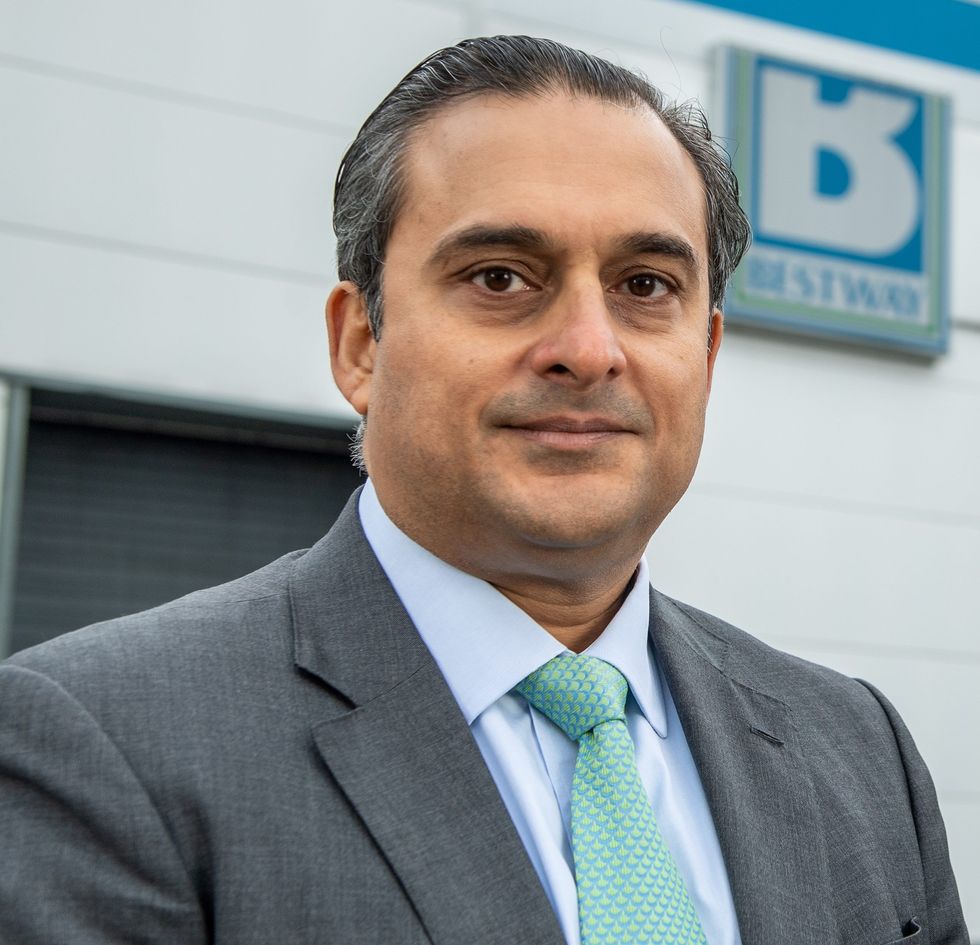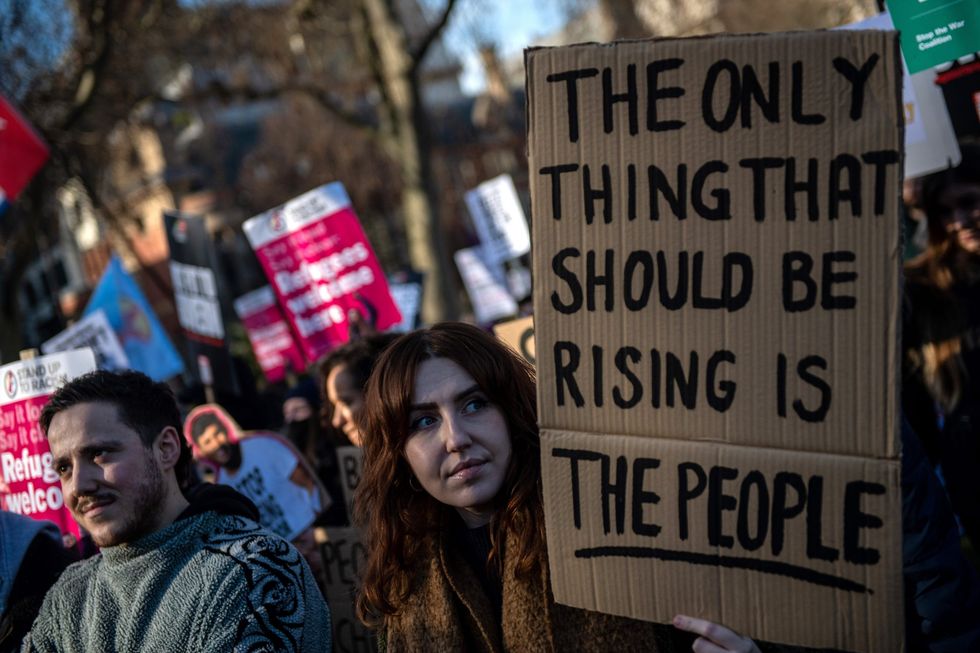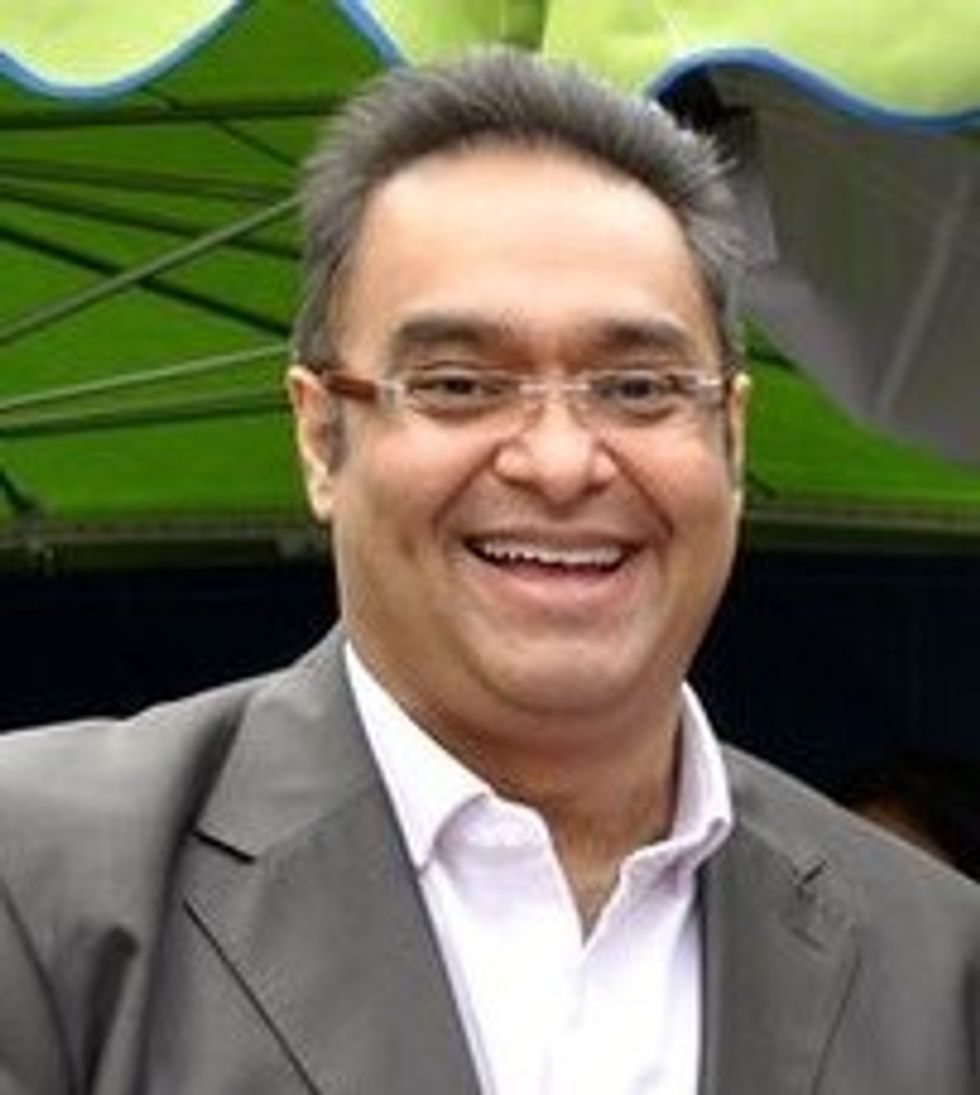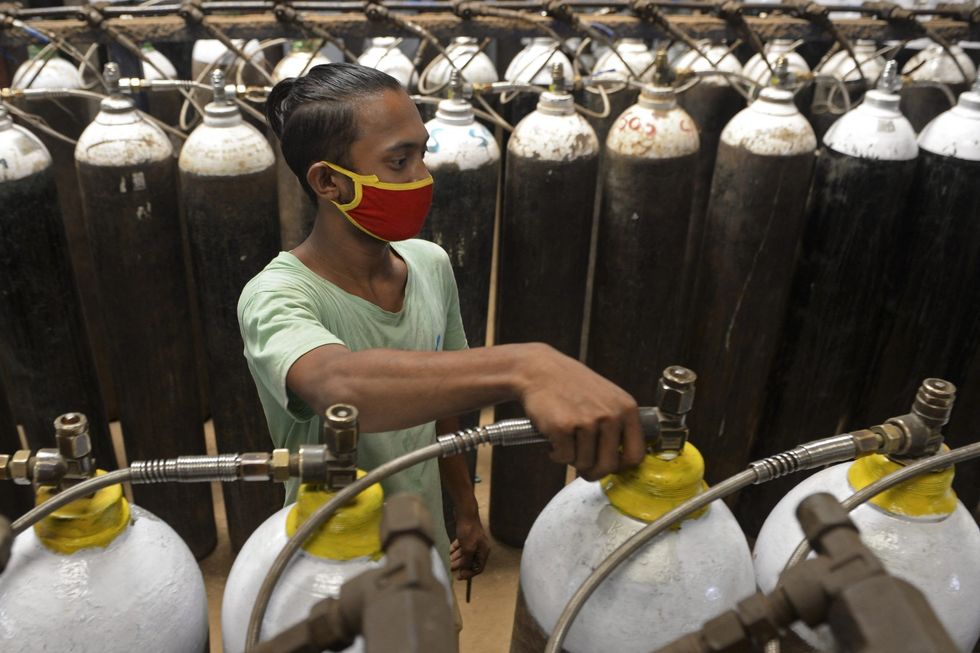The chancellor must do more to help families and business.
The call comes from Lord Karan Bilimoria, who is stepping down as the president of the Confederation of British Industry after two years at the helm.
In an exclusive interview with Eastern Eye, the peer said the cost of living crisis was hitting manufacturers and retailers badly.
“We at the CBI have been saying, literally non-stop, that the government helped hugely during the pandemic,” said the out-going leader of what is considered to be the boss’ union.
“It helped save jobs, save businesses, save the economy. Where is the acid test of that?
“All the help that was given has been the government grants.
“But the pandemic maybe over, but even before the sad war in Ukraine, we've seen labour shortages, we've seen inflation, energy price increases going across the sector, supply chain issues now exacerbated by the Ukraine crisis.
“We’ve said that consumers are being squeezed because not only have you got consumers paying more, whether it's for energy or whether it's for food, but businesses are suffering.”
The hike in prices was having a detrimental impact on small and medium sized businesses (SME), he explained.
“If you look at the curry restaurant sector, all the input prices have gone up much more then this official figure of eight or nine or soon to be 10 per cent.
“In many cases, their prices have doubled in some categories, and so they are facing huge supply side inflation.
“They can't pass it on fully to the customers.
“You've got businesses being squeezed, consumers being squeezed, and they need help from the government in a time like this.
“The government has listened and has started to give help to consumers in their latest move.
“However, 15 billion or 20 billion, depending on how you calculate it, is a start, but I think the government will need to help more.
“The government also needs to continue to help business as well.
“It doesn't help that we've got the highest tax burden in over 70 years, that's always going to be difficult at any time, let alone at a time like this.”
Lord Bilimoria warned that inflation was much higher than official figures, and this was affecting consumers.
Food poverty
Businesses are being forced to pass on the increasing costs.
Not only that, they are also seeing a change in the way customers are buying food, said Dawood Pervez, managing director of Bestway Wholesale.
“As wholesalers or retailers pass increased costs onto the consumer, the consumer will be spending more and more for less than less,” said the MD of the UK’s largest independent wholesaler, serving over 130,000 independent retailers.
“That will lead to a change of habit for a large chunk of the consumer base.

“Some of them will start eating out less, some of them will start buying very carefully, or change their buying habits, maybe do bigger weekly shop, bigger planned shops, or maybe shop at low discounter.
“But there will be a chunk of society that will end up living, what we would describe as day to day.”
This change in shopping habits mean that those on low incomes will end up in “food poverty”, he warned.
“The saddest thing about this is because it's not planned, you actually lose efficiency.
“It's already happening, it's not a case of it's going to happen, parts of the population are falling into financial distress.
“Therefore, you could describe it as food poverty, to some extent.”
Like Lord Bilimoria, Pervez said he wanted the government to intervene.
“I would, again, urge the government to look at local business rates to kind of help the local community.
“It is good to have local stores. They want to encourage them not just because it's an amenity to people who live in this country, but it's good for society, it's good for communities, right?
“If so, then they need to ensure that there are policies in place to encourage people to run and open local stores.

“One of the ways they can do that is by looking at the business rates.
“Business rates don't get revalued very often.
“It's every five years, and they're usually woefully out of date by the time they're even done.
“In the meantime, you've got online companies that are paying industrial business rates, which are very low.
“But they're retailing into people's houses, using the same roads, tearing them up creating potholes causing a general nuisance.
“I would say look at business rates for small shops at the same time as looking at an online sales tax for those who operate from industrial premises.”
Vicious circle
In Leicester, the city’s oldest vegetarian restaurant, Bobby’s, is a case study in rising costs.
Last year, in the month (February 2021) that the prime minister set out his roadmap to lifting the lockdown, it celebrated 45 years in business.
The restaurant’s owner, Dharmesh Lakhani, a former chair of the Belgrave Business Association, told Eastern Eye that he has to find an extra £1000 per month for fuel.

When it comes to packaging and other costs, it means he needs to find an extra £100 every day before he breaks even.
“We have less customers come in because they have less money in their pocket,” he said.
“We have to absorb a lot of that, but what that also happens by trying to absorb it, you end up cutting hours having less people working.
“In turn this leads to less money in the market, because when people earn less than they're going to spend less.
“It's a vicious circle.”
Like other business owners and leaders, Lakhani said he would like to see taxes cut and caps on fuel prices for business.
“If the government can help in any way, shape or form, that would be welcome.
“During Covid, we had tax rebates, but nobody foresaw everything going up so dramatically.
“With residential properties, there are energy price caps, but we use fuel in business, right?
“They should try to put energy price caps on businesses.”
The outgoing CBI president, Lord Bilimoria, is also concerned that the government has not tackled the continuing labour shortage in the UK, which began before the war in Ukraine.
“Labour shortages have combined with an energy supply crunch amid existing supply chain challenges to present an extraordinarily tough set of circumstances.
“Short-term, the government should update the shortage occupations list to relieve pressures, and add immediate flexibility to the apprenticeship levy, so firms can use those funds to access the labour and skills they need to succeed.
“Longer term, the government should make the Migration Advisory Committee independent, similar to the Low Pay Commission, so the UK’s immigration system can be more responsive to economic needs.”
Burying heads in sand
It is something with which the Bestway Wholesale MD, Dawood Pervez, agreed.
“If you want to be more self-sufficient as a country and actually do some manufacturing and provide basic services, you do need labour.
“I don't think we've got access to sufficient labour in this country as is, so an answer, a solution has to be found.
“You can’t just bury your head in the sand.
“There's a need for farmers, seasonal workers, warehouse workers, factory workers.
“If we do go through a massive contraction in the overall economy, or if there's a massive crash, and lots of businesses end up closing, then there might be a surplus of labour.
“But right now, there isn't.”
Business leaders are also tired of what they see as the government making excuses for the cost of living crisis.
“We keep hearing this is due to Brexit, you need to sort that out,” said Lakhani.
“They've known about Brexit for a number of years, that's not something that just popped up.
“Brexit’s an excuse, we’ve had enough time to plan for it, obviously, we didn't.”
For Lord Bilimoria, the current crisis is a true test of government leadership.
“My late father, General Bilimoria, who was commander in chief of the central Indian army, in charge of 350,000 troops, was a great inspiration.
“He said, ‘The true test of leadership is not in the good times but in times of adversity.’
“We have put that to the test in the last two years, be it dealing with the pandemic or the Russian invasion of Ukraine.
“Having nearly lost my business three times, with each time being entirely different, I know that you cannot always predict crises.
“After all, who could have predicted the pandemic?
“Instead, what matters is how you respond.”
Business as a force for good
Lord Bilimoria has been president of the CBI for two years. In his valedictory message, the crossbench peer, revealed how business reacted to world events during as president of the CBI.
“Business is a force for good”
When the second Covid wave took place, I remember the Indian high commissioner approached me in my role as the president of the CBI for help. You remember the tragic scenes of India running out of oxygen. She set up a war room in the Indian high commission in the Gandhi Room. My two chiefs of staff, one other member of my team and I went there. We said we would help. I had an emergency meeting of the president's committee, and we had our members helping. British oxygen sent cylinders and generators. Rentokil, one of our members, sent £2.5 million worth of equipment.
Pfizer hadn't even had the vaccine approved in India at, that stage. It sent $70 million worth of pharmaceuticals to help to India. We advised India on setting up Nightingale hospitals. So, we really pulled out all the stops and helped a lot. After the crisis was over, the high commissioner said, of the whole of the world which helped, the Indian high commission in London was most supportive, and she said that it was thanks to the CBI. I’m so very proud of that.
Fast forward to this February, when the Russia-Ukraine war started. Britain announced sanctions straightaway, and the CBI supported the sanctions. The next day, my chief of staff sent me a message saying, Karen, just let you know one of our members, Vodafone, is giving free phone calls and data to anyone in Ukraine. I thought about it. The war started on 20th February, on a Thursday, and on the Saturday, I asked my chief of staff to contact the Ukraine ambassador. I'd met him twice, once virtually and once when he went to his first ever cricket match at the Oval in a match against India. I spent the whole day explaining cricket to him. So, I said ask him if he remembers me, and ask him if he needs any help.

The ambassador got on the phone, and I said, “My friend the CBI is offering its help. Do you need any help?” He said, “Please come and see us on Monday morning.” I went there on Monday morning, and if I could have taken a picture of how they looked at that time…they had not slept. They were in a state of complete shock. He said, “The Russians thought they would walk in and take over the country in the way the Taliban took over Afghanistan, and they have not taken over, and we will fight. We've conscripted everyone over 18. We've got lots of problems.” He told us that Ukraine had this and that problem, for example, they didn’t have ration packs, and could we help?
Within 24 hours, I convened an emergency meeting with my president's committee chairs and trade associations. I went back to the embassy on the 1st of March, and I sat next to the ambassador in the embassy with a virtual screen with the 75 who's who of British industry. “Now, tell them what you want,” I said. From the next day onwards, we started sending ration packs, thanks to Vestey Foods, the biggest supplier of ration packs to the Ministry of Defence. We have now sent three million national packs to the frontline.
They needed various things. So, the CBI sprang into action. Fast forward a few more weeks, they said the supermarkets were running out of food, could your supermarkets help? This time we had the emergency meeting in the CBI office with Ukraine’s economic deputy ambassador next to me. We had the food minister from Ukraine live from Kyiv. I had the who's who of retail and supermarket suppliers on a call. “This is what they need. A pack with enough calories and these ingredients. This is what we want to send to feed one person per week. Can you help?” I asked. They said yes, but we don't have cartons of this size.
Smurfit Kappa, is one of the largest manufacturers in the world of packaging. The chief executive, Eddie Fellows, was on the president's committee CBI. One phone call to Eddie, and he's a Birmingham University alumnus, where I’m chancellor. I said, “I need your help. We need these boxes for these food boxes.” He said we don't make that size. I said can you make them? Of course. He asked how many we needed? One million was the first order and we needed it now. There was a pause on the line, and he said, “Okay, we’ll down tools, we'll get them to you.” We have now sent hundreds of 1000s of these ration packs.
The Daily Mail’s charity, Mail Force, got in touch with us. “We've seen what you're doing”, they said. “Our readers love what you're doing. Can we support you?” They've donated five million pounds. The Ukrainians have matched money that's been raised. This has just made me so proud of the CBI. When I tell the stories of what we did with the business organisations, it’s not all about trade, investment, and growth. Business is a force to good as well.
Lord Bilimoria was speaking with our editor-at-large, Barnie Choudhury.

















 Beets, bears, and brilliant chaos—Dwight Schrute was ready to make Schrute Farms the weirdest B&B on TVGetty Images
Beets, bears, and brilliant chaos—Dwight Schrute was ready to make Schrute Farms the weirdest B&B on TVGetty Images  Too fabulous to function—Jean-Ralphio was born to star in his own disaster-fuelled comedyGetty Images
Too fabulous to function—Jean-Ralphio was born to star in his own disaster-fuelled comedyGetty Images  Omar - a prequel about his early days could’ve been HBO’s next gritty masterpieceGetty Images
Omar - a prequel about his early days could’ve been HBO’s next gritty masterpieceGetty Images Deadpan, dark, and delightful—April Ludgate’s FBI spin-off would’ve been everythingGetty Images
Deadpan, dark, and delightful—April Ludgate’s FBI spin-off would’ve been everythingGetty Images Sassy, spiritual, and full of secrets—Lafayette’s backstory was screaming for a supernatural seriesGetty Images
Sassy, spiritual, and full of secrets—Lafayette’s backstory was screaming for a supernatural seriesGetty Images From Victorian poetry to vampire slaying, Spike’s centuries-long saga deserved its own spotlightGetty Images
From Victorian poetry to vampire slaying, Spike’s centuries-long saga deserved its own spotlightGetty Images Confidence, quirks, and questionable fashion—Schmidt’s next chapter could’ve been rom-com goldGetty Images
Confidence, quirks, and questionable fashion—Schmidt’s next chapter could’ve been rom-com goldGetty Images The villain we hated to love—Negan did get his spin-off, and it’s a bloody good oneGetty Images
The villain we hated to love—Negan did get his spin-off, and it’s a bloody good oneGetty Images Whimsical and wise—Luna’s magical adventures would’ve been a dreamy, otherworldly delightGetty Images
Whimsical and wise—Luna’s magical adventures would’ve been a dreamy, otherworldly delightGetty Images Chaotic queen energy—Gina’s influencer-era spin-off would’ve broken the internetGetty Images
Chaotic queen energy—Gina’s influencer-era spin-off would’ve broken the internetGetty Images 
 Crispello was originally launched by Cadbury in the UK in 2012B&M
Crispello was originally launched by Cadbury in the UK in 2012B&M 